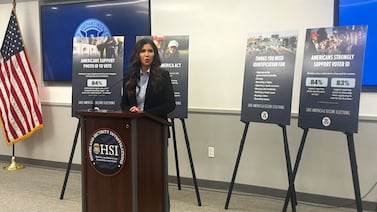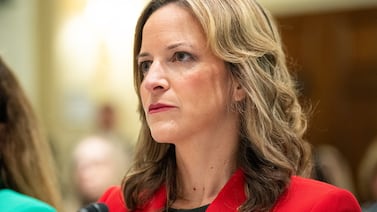Votebeat is a nonprofit news organization reporting on voting access and election administration across the U.S.
This news analysis was originally distributed in Votebeat’s free weekly newsletter. Sign up to get future editions, including the latest reporting from Votebeat bureaus and curated news from other publications, delivered to your inbox every Saturday.
President Donald Trump wants to run a new census before next year’s midterms — and leave undocumented immigrants out of the count. That wouldn’t just reshape political maps. It would warp the data that governments, businesses, and researchers rely on for the work they do and the investments they make. An incomplete or rushed count means flawed decisions, with consequences that last far beyond one election.
The census gives the government its most complete snapshot of the country. The federal government uses it to decide where to send billions of dollars for Medicaid, food assistance, school lunches, and disaster relief. States use it to plan hospitals and roads. Businesses choose store locations based on it. Public health officials track disease outbreaks with it, and emergency managers map evacuation routes using it. Even insurance companies rely on it to set rates.
If we give the Census Bureau less time to plan and execute what amounts to an extraordinary logistical challenge, we undermine its ability to do this work reliably and well. And if we undercount certain communities — a risk that grows if the process gets shortened or harder to join — those places lose representation in Congress and the Electoral College. They also lose money and services they would otherwise qualify for.
What Trump is calling for with the census fits into a bigger pattern of changes in how the federal government collects data. Trump’s 2026 budget axes funding for NASA satellites that track carbon and monitor plant health — tools scientists use to study climate change, plan for disasters, and help farmers know when to plant. Kill the satellites, and we’re flying blind on what’s happening to our planet.
Last month, after a weaker-than-expected jobs report, Trump fired Bureau of Labor Statistics Commissioner Erika McEntarfer. He claimed the numbers were wrong but offered no proof. Economists warn that moves like that can shake confidence in the agency’s independence and make people doubt whether they can trust official jobs and economic data. He’s appointed a new head of the agency that he likes better.
Together, these examples show how politically motivated decisions can shape — and sometimes distort — the data we all rely on. That matters because so many everyday but critical decisions depend on accurate information. Grocery supply chains use population numbers to predict demand. Emergency managers need precise maps of where people live to plan evacuations. Cities and states depend on complete counts to qualify for funding.
Other presidents have clashed with federal data too. George W. Bush faced accusations of downplaying or doctoring reports on climate science, and other administrations have shifted how unemployment or inflation is measured. But those were narrower fights. Trump’s approach covers more ground and acts more directly. He is proposing to change the census, cutting climate satellites, and intervening in jobs data all at once. Some of that may aim to limit information that could work against him or to align the numbers with his preferred message. Cutting certain data programs also makes it harder to measure the effects of policy choices later.
When politics starts shaping how data is collected or shared, the damage doesn’t end with one administration — it lingers. Once trust in official statistics is broken, it can take years to rebuild, and in the meantime, every plan and policy is built on shaky ground. Keeping these systems accurate and independent isn’t a partisan issue; it’s what keeps communities safe, the economy steady, and government accountable to the facts.
Jessica Huseman is Votebeat’s editorial director and is based in Dallas. Contact Jessica at jhuseman@votebeat.org.





